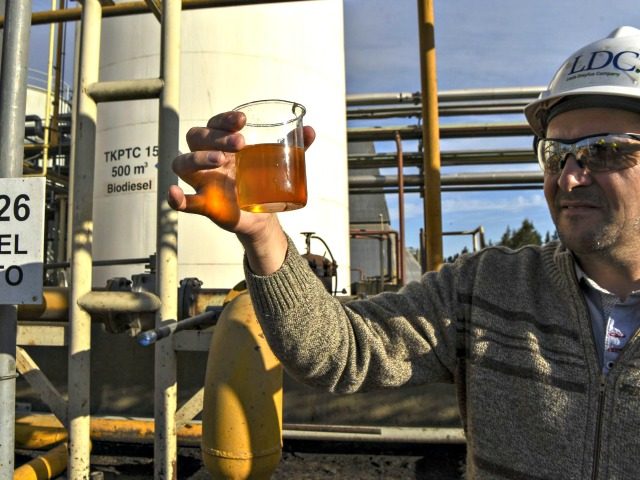President Trump’s economic boom is repairing forgotten America. Deregulation and tax reform are spawning jobs and wages for the middle class.
But beneath good news, swamp creatures still swindle working America with Wall Street scams. We call these scams the “Renewable Fuel Standard” (RFS).
The Trump administration has dutifully drained parts of the swamp, but there’s work to be done with the RFS. And it needs to happen fast.
This week, Philadelphia Energy Solutions, the largest refinery on the East Coast (where relatively few refineries operate), filed for bankruptcy as it owes the EPA $100 million in overdue RINS credits. If the company goes under, 1,100 jobs will be lost and thousands more are at risk elsewhere at refineries struggling to comply with the RFS.
The RFS is a Wall Street subsidy masquerading as clean energy. It’s a disastrous provision of the Energy Independence and Security Act of 2007, a bipartisan attempt to lower gasoline consumption. This Bush-Pelosi monstrosity forces oil refineries to blend 15 billion gallons of biofuels, mainly ethanol, into annual gasoline production. President Obama’s activist Environmental Protection Agency (EPA) heightened this requirement.
Both the EPA and Congress knew that the RFS would be unfeasible for small refineries. Few small refineries have adequate capital for expensive ethanol production. Forcing biofuels production onto small refineries would force them out of business. Even if they could produce ethanol, onsite mixing is bad business. Blending ethanol with gasoline causes resulting mixtures to degrade quickly. For guaranteed quality, ethanol is mixed into gasoline shortly before its pumped into vehicles.
But lo and behold, the ever-so-generous EPA threw small refineries a “lifeline” by creating a fake marketplace. Instead of going bankrupt immediately, small refineries can purchase “credits” known as “RINS” (Renewable Identification Numbers).
RINS magically appear when biofuel producers make biofuel. The EPA credits RINS to biofuels companies as gallant tokens of appreciation for fighting global warming. Small refineries have no choice but to subsidize biofuels by purchasing RINS lest they face painful EPA lawsuits. Corporate welfare is still corporate welfare even when it’s for “climate justice.”
So instead of killing them immediately, the EPA graciously allows small refineries a slow and painful death through RINS.
But wait, there’s more to hate. RINS credits are traded by Wall Street speculators, completely screwing small refineries out of accurate and fair prices. Speculation causes wide RINS price fluctuations, sometimes doubling during high-fuel-demand summer months. Small refineries kneel to the will of Wall Street investors betting on corporate welfare in a fake market.
Even worse, the supposed perpetrators of climate change, large multinational oil producers, profit by trading RINS. Companies like British Petroleum, Shell, and the trade association American Petroleum Institute defend the RFS by lobbying. These companies have resources to produce and trade ethanol, and the government guarantee they get paid for it. Bum deal.
Pause for a moment and reflect on the hilarious fact that Nancy Pelosi funneled huge money to big oil.
It’s clear that the RFS and its heinous RINS credits are corporate welfare scams for fake environmental benevolence. It gets worse when you consider that ethanol decreases gasoline efficiency and raises carbon emissions. The RFS is a damaging – and stupid—regulation that should be repealed immediately.
Sadly though, political climate makes RFS repeal nearly impossible. Important states for presidential elections, namely Iowa, Wisconsin, and Ohio, are concentrated locations of RFS beneficiaries. Political candidates over the years have pandered to RFS and its special interests.
Nonetheless, there are good quasi-market reforms that could lessen RFS damage without angering its ardent defenders. President Trump, his administration, and Congress should work to pass available legislative solutions short of repeal.
Senator Ted Cruz (R-Texas) proposed capping RINS credits at ten cents each. A price cap would provide stability for oil refineries by ending Wall Street speculation. Another solution that may sit well with President Trump is to provide RINS credits for exporting biofuel blends. Currently, companies receive RINS for importing biofuels from foreign companies but go uncompensated for exporting the same products. This is an artificial distortion that promotes bloated trade deficits, which President Trump famously criticized on the campaign trail.
Both solutions would temper the treachery of an awful policy. Ideally, the RFS should be repealed, but given its unlikelihood, any pro-market reform is welcome. Corporate welfare for fake commodities is not healthy for our economy.
Jobs and affordable energy are at stake as President Trump helps forgotten America recover. It’d be shameful to forget the hardworking employees that fuel our country.
Andrew Magloughlin is deeply involved in the conservative and libertarian movements. He has think tank and political campaign experience and previously led the Young Americans for Liberty chapter at American University in Washington, D.C.

COMMENTS
Please let us know if you're having issues with commenting.